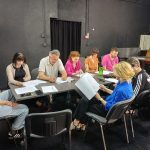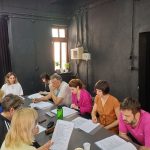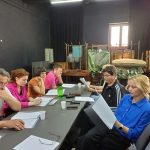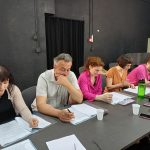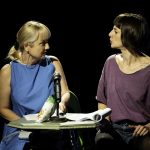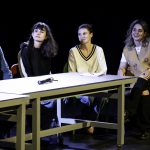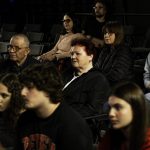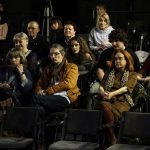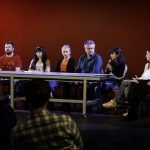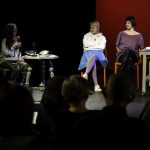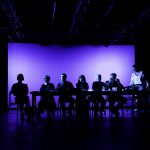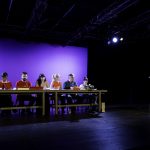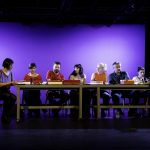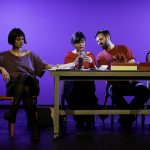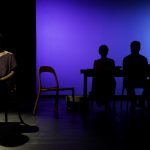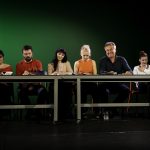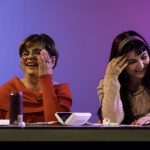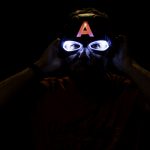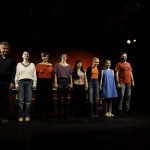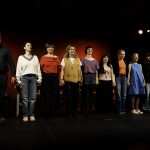Partner: Teatrul Odeon
Play: Seeing red
Playwright: Raluca Cîrciumaru
Translation session with: Florin Galis (from Romanian to Italian)
Meetings: 23-28 May 2025, Studio Hall, Bucharest
Public presentation: 28 May 2025, 19.00, Studio Hall, Bucharest
Director: Mara Oprea
Cast: Alina Berzunțeanu, Dimitrii Bogomaz, Mădălina Ciotea, Sabrina Iașchevici, Ruxandra Maniu, Ioana Mărcoiu, Gabriel Pintilei, Simona Popescu
From 23 to 28 May 2025, Teatrul Odeon organized an R&D workshop on the play Seeing red (“Roșu În Fața Ochilor”) by Romanian playwright Raluca Cîrciumaru. Together with director Mara Oprea and actors Alina Berzunțeanu, Dimitrii Bogomaz, Mădălina Ciotea, Sabrina Iașchevici, Ruxandra Maniu, Ioana Mărcoiu, Gabriel Pintilei, Simona Popescu, the playwright explored the piece’s staging possibilities. A professional session with the translator Florin Galis also explored the broader issues related to translation and cultural adaptation. On 28 May at 19:00 at Studio Hall in Teatrul Odeon, the text was presented to the audience as a reading performance.
Seeing red
A new student in class VI-B makes life difficult for his classmates. The parents unite against him, but… they can’t manage to get along with each other. The one thing they have in common? They all want Marius gone from the school.
A story about bullying, systemic injustice, and the subjectivity and aggressiveness of parents who will do anything to protect their children. A social satire in which no one is entirely right, and no one is willing to back down.
Raluca Cîrciumaru
Raluca Cîrciumaru graduated in Theatre Studies – Theatre Journalism and Cultural Management (in 2021) and holds a master’s degree in Playwriting (in 2024), both from the National University of Theatre and Film I.L. Caragiale in Bucharest.
As a playwright, she made her debut at Metropolis Theatre with a contemporary adaptation of Miss Julie by August Strindberg, directed by Mara Oprea. More recently, her play How to Write Shakespeare premiered at the Northern Theatre in Satu Mare, directed by Leta Popescu.
As a journalist and theatre critic, she contributes to cultural publications such as Teatrul Azi and Ziarul Metropolis. She is currently part of the curatorial team for the 2025 edition of the National Theatre Festival.
Raluca was one of the participants in the Playwriting Workshop #1, coordinated by Mihaela Michailov, in the frame of the Fabulamundi. Playwriting Europe – New Voices project.
Starting with the very title, Seeing Red, Raluca Cîrciumaru’s text presents a challenge from the perspective of transposition—through its translation into another language and therefore another culture.
I will attempt to explain why a literal translation of the title would sound like this, which would obviously be a completely inadequate rendering.
In order to obtain the best solution, an adaptation is needed that takes into account the target language and culture.
The same approach must be applied to the numerous elements I would call local, which form the structure of the play.
I refer here to certain structural categories, figures, and institutional practices—both in the literal and metaphorical/ figurative sense.
Undoubtedly, when transferring these categories through translation, a double adaptation is necessary. The first is strictly linguistic, ensuring that the lexical structures in the original text find their appropriate equivalents in the target language. The second, of course, must be carried out on a cultural level so that the local aspects portraying and outlining society and the institutional sphere—with special attention given to the school environment—can be “exported” in the best possible conditions.
To translate a dramatic text with these characteristics requires the translator’s creativity in finding equally recognizable and meaningful figures within the social-cultural structure into which the text is being transposed.
I feel the need to clarify something. The text contains all the elements/ingredients that give it a universal quality. First of all, the theme — school bullying — is, unfortunately, a reality present throughout the world, at least across Europe. Secondly, the approach —soft parenting — is also a reality of the past 20 years, directly connected to teenagers’ behavioral issues.
However, there are a few local elements in this text that are highly recognizable and full of significance for the native audience. These are the ingredients that require, as mentioned earlier, the translator’s creativity and make exporting the text not entirely straightforward. Furthermore, they are a clear typological trait of the “colorful” characters — both literally and figuratively — who unleash an entire arsenal of beliefs, fears, anxieties, convictions, imagination, and, last but not least, practices.
Regarding the latter, the text contains several types of practices — actions intended to describe a certain character in a pejorative, comical, or negative light.
The practice of bringing gifts to the form teacher during parent meetings, turning a blind eye to a student with so many extracurricular activities that she rarely attends classes, participating in school competitions/ Olympiads, taking private lessons (tutoring), or relying on personal connections — all are present in the text and could pose serious challenges for a translator from a country or culture where such practices do not exist.
Perhaps the most demanding in terms of creativity is the practice of witchcraft, whose continued existence in the 21st century might come as a surprise in some parts of Europe, though it certainly does not require adaptation. The challenge in this case lies in finding equivalents in the target language for an endless array of humorous and frightening ingredients that are a guaranteed source of comedy.
In conclusion, I would say that it is precisely these specific aspects in the text that make it a remarkable X-ray and radiography — crafted through dramatic means — of a small universe: the Romanian school/ the Romanian educational system. This serves as a reflection of a macro-universe: the present-day world we all live in, across Europe and beyond.
– Florin Galiș
